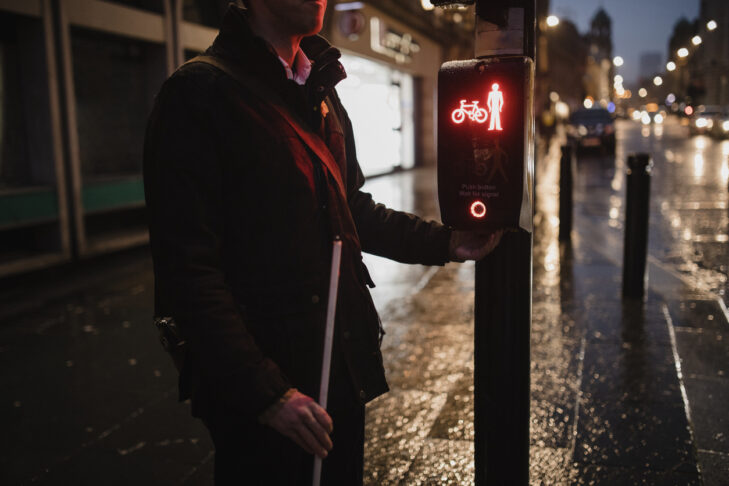“As long as this exists, this sunshine and this cloudless sky, and as long as I can enjoy it, how can I be sad?”
―Anne Frank, “The Diary of a Young Girl”
How does a person who is deaf or blind (or both) avoid touch or tactile communication in the face of a “hands-off” pandemic?
Am I being cautious or paranoid when I want to say, “Don’t touch me!”? In the deaf and blind world, tactile communication is indispensable. Isolation is the opposite of what this community seeks.
But here’s where we run into a little trouble when a pandemic enters the scene. Because I am blind with deafness (Usher syndrome), I order more and more things to be delivered. I did it just this past Friday, when, as the coronavirus numbers were climbing and self-isolation seemed inevitable, I needed a bagel and lox to add some normalcy to my life, so I called for a delivery. And, as expected, the delivery person brought the items to my front door.
I usually explain that I can’t see and the exchange between us is smooth. This time we hit a few bumps. English was not the delivery person’s first language (and for someone with a cochlear in one ear, it’s even harder to decipher). Thus, a mutual frustration was shared.
I took the bag, graciously thanked him and waited for his departure.
Instead, he stood there, obviously asking for something. I said, “Tip? It’s paid. It’s on the bill.” I offered a second smile and prepared to close my door.
Again, he stepped forward and assumed I could see. I thought he was telling me his name, so I repeated back, “Name!”
“No, no,” he said, politely. I imagined him shaking his head.
He quickly took my hand in his and placed it on an iPhone.
“Name!” he said.
“I don’t use a pen or pencil. I can’t see; I am totally blind,” I told him again. I wasn’t sure what I was supposed to do. I just knew I wanted everything that was inside that bag.
“Make letter, name!” he said, taking my finger over his iPhone.
Each time I tried, he moved my finger from one spot to another on the screen, and another, and another. I started to wonder if this was a game.
“I can’t see. Perhaps I can call the shop and…”
“No, no,” he interrupted.
“I put name in. Done!” he said politely.
I was stunned. Had I just touched a phone that had been shared by others along this delivery route? Was my coming into contact with another person putting my health in peril? Or was I just being paranoid? I decided to ask others in the blind community how they were dealing with social distancing.
“I cannot be around other people right now for health reasons, so everything about my day-to-day life has changed significantly,” said Sassy Outwater-Wright, who is blind with additional disabilities and chronic health issues. “I can’t touch surfaces right now such as railings, braille signage or [elevator] buttons. I don’t go out; it is not safe for me to do so.”
As the executive director of the Massachusetts Association for the Blind and Visually Impaired in Brookline, Outwater-Wright says being homebound has its benefits. “I have a giant pile of books I’ve wanted to get through, lots of household projects I’ve been waiting for the right time to tackle, and I’m a nonprofit director; catching up on some long overdue sleep is always a priority. I call it ‘quarcation’ and am enjoying the quiet time,” she said.
“I have a good stock of supplies and can get things I need online or delivered. I don’t know how long it will stay that way, and I am concerned about that, but for now, my family and I are safe and healthy and have what we need,” she continued. “There are many blind people who do not have the resources to have supplies on hand, and who cannot use technology to order things, and who cannot get out to get what they need. They’re the ones I worry about, and they’re the ones who need our support now.”
For retired software engineer Mani G. Iyer, who is deaf and blind, having his wife work from home has been his big adjustment. “It just feels weird having her around the house and not be able to communicate with her because she is supposed to be working. Then there is the fear of the unknown and the mind is too busy presenting all kinds of situations, when otherwise it would have been put to good use,” he said.
The once-social Iyer views his restrictions with a bit of blind humor: “I know I can still meet people if they stay six feet away, but how am I going to know I am following that rule?”
“I am very fortunate in that I work for a university that has been ultra-supportive,” said Randy Cohen, a legally blind professor who is the host of the podcast Dangerous Visions. “I am working from home, conducting classes online and doing office hours by phone. I’ve been extremely busy so have not had time to feel lonely or isolated at all.”
He added: “When we return from this period of social distancing, it’s possible that the tactile way I interact with the world—putting my hand on people’s shoulders for guidance, holding handrails, feeling all the elevator-button markers to find the one I want—will be problematic for a while, but I am confident that, with the support of the people around me, I’ll be able to find a successful adaptation.”
As I put on my latex gloves, barely giving it a thought, Cohen’s words echoed in my head—“successful adaptation.” True, that action had become a habit so that I could step outside and use my hands to feel my way around the porch railing and down the stairs. This was my only public forage out into the world right now.
My volunteers, my friends, the cleaning service, my interviews with chefs at restaurants, my temple, my Moth storytelling slams, oy vey, the list goes on, are no longer in this temporary world of social distancing. Clearly, I am a staunch extrovert. It’s hard to sit still! But sit still I must.
I am told that streams of families and individuals walked quietly around a path along a ball field on a mid-week day. We respected each other’s challenges that being leashed to our homes had created.
I have a half-bottle of hand sanitizer left; this means less social contact until it finds its way back on the now-empty shelves in stores. Today, guidelines are even stiffer and I am following them. I am not going anywhere.
I know isolation too well, but in this time of sensitivity what is the best option?
I look forward to spring as I know the flowers in my yard and the fresh leaves on the trees will be within tactile distance. I’ll just let the social part find its way home.
This post has been contributed by a third party. The opinions, facts and any media content are presented solely by the author, and JewishBoston assumes no responsibility for them. Want to add your voice to the conversation? Publish your own post here. MORE



